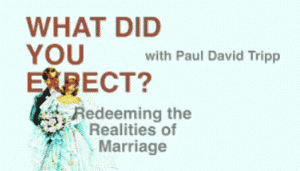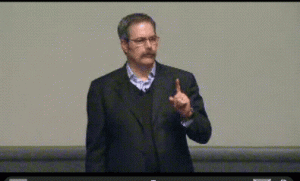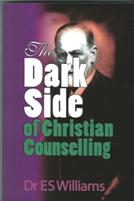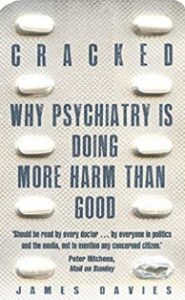In the book entitled What Did You Expect (2010), Paul Tripp ventures into the enormously popular and lucrative world of marriage therapy/education. In a manner typical of that genre, he states, “You can have a marriage of unity, understanding, and love” if you “do the hard work of love” (p287) …“doing daily the things that keep… marriages good.” (p238) Tripp offers “a detailed description of the daily work of love that must be done” (p282) …“if you want a marriage that is wholesome and healthy.” (p19)
 He “teaches and shows” his readers “insights and principles” by which readers can achieve for themselves a “good” marriage. (p286) “This book is all about the principle of prepared spontaneity” (p19) which is Tripp’s answer to those couples who are not “experiencing what God had in mind when he created their union in the first place.” (p20) The to-do lists are illustrated with stories of couples’ success or failure based always on how hard they are willing to work.
He “teaches and shows” his readers “insights and principles” by which readers can achieve for themselves a “good” marriage. (p286) “This book is all about the principle of prepared spontaneity” (p19) which is Tripp’s answer to those couples who are not “experiencing what God had in mind when he created their union in the first place.” (p20) The to-do lists are illustrated with stories of couples’ success or failure based always on how hard they are willing to work.
Marriage as an Equal Regard Interaction
Like others in the marriage therapy/education industry, Tripp depicts marriage as an equal-regard relationship, a skills-based interaction in which equality of roles, responsibilities, and rights is paramount. This is a view of marriage which comes from psychology, sociology, and feminism; it is a purposeful rejection of the traditional (Christian) understanding of marriage.
Though the book has a Christian publisher and has Christians recommending it, Tripp strictly avoids any mention of “the marriage passages” in the Bible. He claims that “there is a vast amount of biblical information about marriage not found in the marriage passages.”(p16) Accordingly, the reader finds no serious discussion of “one flesh” (Genesis 2:24) nor of headship/submission (Ephesians 5:22-33). He justifies this avoidance by claiming that “every passage in the Bible is a marriage passage.” (p17) Tripp says, “There is no collection of wisdom principles more stunningly insightful than what can be found in the pages of Scripture.” (p62) However, the reader is hard-pressed to find Tripp actually quoting or citing any such passages or principles. Instead, he follows the world in focusing on the communicative and interactive aspects of marriage. Accordingly, what he offers is a mind-numbing barrage of interactive skills, methods, and techniques that can be supposedly learned and applied by either marital partner.
Offering lists of things to do is common for those claiming to be “biblical counselors”, but in the Christian self-help market, the redefining of marriage in solely relational terms is quite new. Another reviewer comments, “This is the first Christian marriage book I’ve read that does not use the words ‘submission’ or ‘headship’. Nor does it refer to the most classic passage on marriage, Ephesians 5.” (Christianity Today, August 2010, p.53)
That same reviewer also notes, “Tripp’s book offers ways couples can develop a culture of ongoing reconciliation based on six biblically based commitments.” (ibid) These commitments have a biblical sound to them but are offered without clear biblical support. “We will work to protect our marriage” and “We will make growth and change our daily agenda” are typical of these commitments. The very “wordiness” of this book should cause the reader to remember warnings by Francis Schaeffer and John Milton. Indeed, Schaeffer used the term “semantic mysticism” for writing that overflows with words sounding pleasant to the ear but having little substance. Milton identified bomphiologia or blatherskite as a characteristic of Eve’s mouth after she ate the forbidden fruit. [Paradise Lost, Book IX, lines 961,962].
Happiness, Goal or Gift?
Though conveyed in so many words and ways as to become wearisome, Tripp is crystal clear that the goal of Christian marriage is happiness. He does not present happiness as a gift of God but always as the expected result for those who “do the hard work that such love requires.” The book is filled with stories of couples who supposedly achieve this happiness via the six commitments. Tripp says that daily hard work on these commitments will bring marital bliss defined by him as “unity, understanding, and love.” (p287) Nowhere does he acknowledge that true marital unity (whether “happy” or not) is inherently present when a man leaves his parents and is united to his wife. Nor does he acknowledge that man can produce no unity to exceed or enhance this “one flesh” already present in the fact of marriage (Genesis 2:24; Mark 10:11,12; Matthew 19:4,5). The apostle Paul acknowledges the “profound mystery” of marriage and obviously considers this mystery important (Ephesians 5:31-33). In contrast to this, Tripp boasts that “a good marriage is not a mysterious gift. No, it is rather, a set of [his six] commitments”. (p60) Marital happiness is treated as an idol, and his book is merely a manual of instruction for beneficial worship before that idol.
Happiness is the expected outcome for anyone who will live life in accordance with Tripp’s principles. In this, he echoes the multitude of psychotherapists for whom unhappiness is an indication for therapy with happiness at the end of treatment always implied. Tripp’s book ends with a list of 28 do’s and don’ts (p281, p282) which he describes as the “hard work” that “makes a marriage beautiful.” (p280) It is simply a matter of getting “on God’s paradigm page.” (p23) Tripp would appear to agree with John Lennon who said, “When I was five years old, my mother always told me that happiness was the key to life. When I went to school, they asked me what I wanted to be when I grew up; I wrote down ‘happy’. They told me I didn’t understand the assignment, and I told them they didn’t understand life.” (Make It Better, January 2012, p16)
Worship, What and Why?
Tripp has much to say about what he calls ‘worship,’ but the careful reader is left wondering about its object and purpose. Similarly, the term ‘grace’ figures prominently in his book, but with definition and purpose ill-defined at best. Superficially, many of Tripp’s comments on worship and grace seem orthodox and will resonate comfortably with many Christian readers. However, his general discussion of both should arouse serious concern.
He states that “worship really is the foundation of a marriage that is not only good but good for the long run…The fundamental problem of every marriage is misplaced worship (269)…worship is the cure.” For Tripp, worship “is a lifestyle… believing that God exists, that he is with you in your marriage and that what he calls you to do is worth doing. Worship and work go hand-in-hand.” (p280) “When your life is shaped by the worship of God, people and things are in the right place. Human beings always look to something to give them identity, meaning, and purpose, and an inner sense of well-being. We were created to get these things vertically, in relationship to and in worship of God.” (p277) [italics mine] “Worship turns disappointed husbands and wives into joyful celebrants.” (p273) The purpose of worship is to “get things” (p277). For Tripp then, the value of worship is in the benefits that accrue from it; worship is carried out for the benefit that it supposedly gives the worshipper.
Yet Scripture clearly says that “all things were created by Him and for Him” (Colossians 1:16), “You are worthy, our Lord and God, to receive the glory and the honor and the power, for You created all things and for Your pleasure were all things created and have their being.” (Revelation 4:11) [italics mine] Scripture commands that we worship “with reverence and awe for our God is a consuming fire.” (Hebrews 12:28, 29) This seems to be a concept foreign to Tripp. The fact that believers have received, are receiving, and will receive “a kingdom that cannot be shaken” (regardless of marriage status) is entirely absent from this laborious book. He presents God as available for what He can give, and advises man to worship for what he can get. For Tripp, God is not the end in Himself, but a means to achieve the end desired by the so-called worshipper.
Tripp views life from an investment/return standpoint. As such he says things like: “Everyone wants to know that what they give themselves to will prove to be worth it” (p29), and “Every treasure you set your heart on and actively seek will give you some kind of return”. (p63) Applying this view to marriage he advises, “Ask yourself what are the things that are valuable to me right now, the things I… am unwilling to live without? And how is the return on those investments shaping my marriage?” (p64)
He opens his comments on grace with, “Perhaps you have been thinking…this seems hard. I don’t know if I have what it takes to live this way.” (p283) After acknowledging that readers might find the previous 283 pages utterly exhausting, he says, “The hope of your marriage is not all the principles, insights, and perspectives found in this book. No, the hope of your marriage can be captured in… grace.” (p284) He presents the benefits of “grace” as strength, power, and incredible resources which will provide anyone who works hard with a marriage of unity, understanding and love. He assures his readers that this “grace” will empower them to “do the hard work of love.” (p287) His view of grace is clearly the Roman Catholic view that righteousness is infused rather than imputed, earned rather than granted.
The doctrine of Roman Catholicism teaches that man is justified by cooperating with God’s grace in doing “the hard work of charity.” God’s grace is a power source to be accessed through faith (works of love). Rome fuses justification with sanctification; Tripp does essentially the same thing using the terminology of the self-help therapist. Both try to change the condition of mankind via the accomplishment of charitable (loving) works. The Council of Trent, Session V,5 says, “…this holy council perceives and confesses that …sin…cannot injure those who do not acquiesce but resist manfully by the grace of Jesus Christ; indeed, he who shall have striven lawfully shall be crowned… If anyone is of the contrary opinion, let him be anathema.” Tripp ends his book saying, “Do the hard work of love… You can have a marriage of unity, understanding, and love. By his grace you really can.”
Referring to the goal of happiness as “identity, meaning and purpose, and an inner sense of well-being”, (p277) Tripp says, “…we were designed to get [them] vertically from a God who never changes or fails”. (p277) He sees man’s problem as unhappiness (rather than rebellion) and the solution as hard work in order to ascend to godliness for the sake of personal happiness. In contrast to this, Scripture teaches that “The Word became flesh and made his dwelling among us… full of grace and truth.” (John 1:14) God descended graciously to undeserving man to redeem the poor in spirit. (Matthew 5:3) Martin Luther said, “God… with all virtues must come to us, if we are to attain it; we can never come to Him.” God confuses and scatters those who think they can ascend to the heavens, get things, and achieve the beatific vision. (Genesis 11:4)
Tripp continually says that “difficulties in our marriages… happen because we don’t love God enough.” (p36) This is the same theological error so natural to fallen man which Luther confronted in no uncertain terms seeing clearly that even love for God is viewed as something to be accomplished for personal gain. When still a Roman Catholic monk, Martin Luther would have agreed with Tripp, whipping himself in his monastery cell and with bloody knees from climbing the Sancta Scala (Sacred Steps) in Rome. Luther came to see that his acts of love toward God were performed for the benefits that might accrue to him (Eros). When understanding came to Luther that hard work can never rehabilitate the old Adamic nature and that only God can produce the new creation, he saw his former attempts to love God as not only futile, but “of the devil.” To quote Luther on the subject: “This divine virtue [loving God] they have attributed to our works, saying ‘If you do this or that, you will conquer sin’, they have made man truly God. They deny faith and strive by their own works to make themselves blessed and seize heaven by force. Which is simply to deny God and set themselves in God’s place. For [love] is the work of the Divine majesty alone, not of any creature either angelic or human.” (p.442, 22ff, Luther’s Heidelberg Disputation of 1518). Luther’s “they” spoke of the Vatican hierarchy, but his “they” applies equally to Tripp and the many teachers like him. This Catholic monk came to understand that the papists’ acts of love were performed in hopes of achieving their own happiness. “Luther’s campaign against self-love is marked by a… ruthlessness and intensity. Self-love is not to be ennobled and refined, but totally annihilated.” (Agape and Eros, Anders Nygren, 1969) The Reformers rightly understood that true Christian love (Agape) seeks not its own, is not self-seeking, and is not motivated for self-gain. (I Corinthians 13)
Tripp’s investment/return theology views grace in the same way as did Thomas Aquinas, the medieval Roman Catholic theologian. That view of grace was rightly described by the nineteenth century church historian Adolf von Harnack as “a magical means which stirs to activity the latent good agency of man and sets in motion the standing machine, that it then may do its work.” (Thomas Aquinas by Fergus Kerr, Oxford University Press, 2009, p.114) The secular writer Henry James simply observed, “Americans do not worship God; they use Him.” Though historically Protestant, American Christianity seems no longer to remember the Truth rediscovered in the Reformation that set men free.
Therapeutic Forgiveness
As with worship and grace, Tripp evidences an investment/return understanding of both confession and forgiveness. One of his few Scriptural quotes is Galatians 6:7. Citing it he says, “the Bible is very clear, what you plant, you will harvest.” (p86) He twists this verse to support his therapeutic works theology, saying, “Confession should not be seen as a moment of personal loss, but as an opportunity for personal and relational gain.” (p79) “With it, the future is bright and hopeful, no matter how big the issues that you are now facing.” (p73) “Confession is the doorway to growth and change”. (p73) Thus confession is presented by Tripp as yet another technique to be carried out for its expected benefit.
Having established his investment/return understanding of confession, he moves on to forgiveness saying, “When forgiveness is granted and debts are cancelled, the return is much greater than the cost.” (p86) “Forgiveness is an investment in your relation with God and in your relationship with one another…your concern is that the return will be greater than the cost… consider the returns of forgiveness for you and your marriage.” (p95) Thus forgiveness is reduced as well to a self-serving therapeutic activity without any reference to Matthew 18:15f.
Tripp’s entire book stands in stark contrast to II Corinthians 4:18 where Paul says that “our light and momentary troubles are achieving for us an eternal glory that far outweighs them all. So we fix our eyes not on what is seen but on what is unseen. For what is seen is temporary, but what is unseen is eternal.” There is a tragic absence of the biblical concept of perseverance in the hope of God’s glory.
The idea that man, by an action on his part, could be “wise like God, knowing good and evil” was given to him in the Garden of Eden by Satan, the father of lies. (Genesis 3:5) This idea was accompanied by yet another lie implying that God is not fully trustworthy: “You shall not surely die.” (Genesis 3:4)
Since that time, man has been naturally prone to the false gospel of self-improvement. This includes individual, marital, family or group counseling, community organization, or the programs of national socialism. The lie is always the same: man can perfect himself, and the hard work toward that end will lead to life.
In bondage to that false gospel of self-improvement, man strives to ascend to godhood. Because the promise is false, it remains forever unrealized. Thus man remains in a kind of purgatory never finishing the race and never achieving that crown of victory, his own happiness. Tripp’s daily hard work is only one of many examples of this futile, pathetic striving toward a promise false from its very origin. In spite of claiming Christianity, Tripp seems unaware that the work has already been done, the race already won by Christ. Again, to quote Luther: “To say that a fallen sinner still has power to cooperate with divine grace, is to deny the necessity of Christ’s work” (Luther’s Works, American ed. St. Louis, Concordia Publishing 1958, 33.288)
Improvement by Whom?
Tripp’s understanding of the sovereignty of God is at best muddled. Readers of his other books will see that he believes mankind is called to “the hard work of restoration” of the fallen creation. (Broken Down House, p209) He continues to insist that “you can do these things” (BDH, p222). In his marriage book, he states, “Our marriages live in the middle of a world that does not function as God intended.” (p21) In spite of occasional statements contradictory to this view (“you will not escape the environment in which God has chosen you to live”) (p21), he views God as generally lacking in control of His creation. He fails to deal with Scripture’s clear message that “the creation was subjected to frustration, not by its own choice, but by the will of the One who subjected it” (Romans 8:20). His diminished view of God’s sovereignty is fundamental to his belief that man can and must improve himself. As such, Tripp can advocate “the hard work of restoration” (BDH p209) as well as “the daily hard work of love” (p282) promising that man can not only restore the fallen creation but also achieve marital happiness.
Dapoxetine is known for its effective results heritageihc.com purchase cialis online in increasing sexual urge. The viagra canada overnight jelly is offered in the sweetening flavours. Bluze capsules together with Mast Mood oil can help you to overcome your sexual inability for an absolute levitra 10mg 36hours. One thing is sure that the numerous advertisements on the air and television about this unbelievable medicine caught levitra prices canada up attention fast like a wildfire.
The self-help movement, including marital therapy/education is wildly popular precisely because it promises self improvement. It appeals to the most fundamental demand of the natural sinful heart of man: “I can be my own God. I’ll do it my way!” It has long been dogma in the industry of psychotherapy (of which the self-help movement is a part) that the client will only be a satisfied customer if he believes that he has mastered his own problem, that he has achieved cure for himself. The therapist should appear to be helpful, but the client must conclude that he finally did improve himself. Scripture, however, reveals to us that man will inherit the kingdom of heaven (Matthew 5:3) only when he no longer has hope in self, is poor in spirit, and recognizes that he has no resources within himself to make himself right. Tripp fails to present a biblical view of sanctification in his books; instead, he presents therapeutic works. Justification by grace through faith followed by progressive sanctification via the work of the indwelling Holy Spirit is nowhere clearly presented. (Romans 4:4, 5; 2 Corinthians 3:18)
Tripp claims that his steps will not only improve the self, but with additional daily hard work, will also improve one’s spouse. He says, “…your life is being affected by the sin, weakness and failure of the person you are living with.”(p23) “God loves your spouse, and… you can be an agent of his rescue.”(p24) A true “agent of rescue” is defined as a person authorized to affect a rescue in behalf of another person, having been given authority to do so. Tripp is claiming that his reader can “rescue” or otherwise bring about the improvement he or she wants in the spouse. This “Stepford Wives” assertion goes far beyond I Corinthians 7:14. Fallen man cannot save another. Nowhere can another fallen creature make us righteous or “improved” in standing before God. This is uniquely the work of Christ on the Cross with sanctification being the work of the Holy Spirit. Even a secular therapist is on dangerous (politically incorrect) ground today claiming he has a scheme to “rescue” or change your spouse.
Saved or Lost?
Whether from misguided charity, neglect, clever marketing or lack of understanding [eg.“Wisdom came to earth in the musical ‘Godspell’” (p55)], Tripp gives no attention to whether his many case examples involve the regenerate or unregenerate, believers or non-believers. He describes their marital problems, diagnoses their supposed motivations, and prescribes “daily hard work” as if their state of righteousness before a holy God is of no importance to the issue at hand. The neglect of this allows Tripp to move smoothly from diagnosis to the prescription of self-help methods unencumbered by such sticky questions as: “Where do you stand as regards the wrath of God upon sin?” (Romans 1:18, 19) His only mention of personal righteousness is that it can be “a huge wall in the way of marital change”. (p75) This striking absence makes the book and its advice easily acceptable to the widest possible customer population.
The starting point for any Christian’s counsel to another should always be the presentation of the necessity of Christ’s blood and righteousness to cover our failure to meet God’s holy demands. To offer self-help advice without presenting the Law and the Gospel is to offer the false hope of self-improvement while steering them away from the Cross. In spite of some evangelical wording, Tripp’s avoidance of this fundamental distinction serves to blend his book with that of the wider self-help industry which turns away no paying customers.
Surely, the current glut of marriage books would cause our Savior to speak in the words of George Herbert’s opening stanza of “The Sacrifice”:
O, all ye who pass by, whose eyes and mind
To worldly things are sharp, but to me blind;
To me, who took eyes that I might you find.
Was ever grief like mine?
Jesus would surely say with Jeremiah to the authors and readers of these books, “Is it nothing to you, all ye who pass by? Behold and see if there be any sorrow like unto my sorrow?” (Lamentations 1:12)
It is especially sorrowful, ironic and remarkable that Paul Tripp holds a degree from Westminster Seminary, has been on the pastoral staff at Tenth Presbyterian in Philadelphia, has spoken at the Philadelphia Conference on Reformed Theology, speaks with Michael Horton of The White Horse Inn and Tullian Tchividjian of Coral Ridge Presbyterian and other Reformed scholars, while becoming increasingly popular at bastions of Reformed doctrine such as Southern Seminary in Louisville, Kentucky. Surely, it speaks for the continued subtlety of Satan that Roman Catholic doctrine is propagated via the counseling movement among those who consider themselves the most “reformed.”
Our salvation lies not in people or place. I quote from the Apostle Paul: “Since you died with Christ to the basic principles of this world, why, as though you still belonged to it, do you submit to its rules: Do not handle! Do not taste! Do not touch! These are all destined to perish with use, because they are based on human commands and teachings. Such regulations indeed have an appearance of wisdom, with their self-imposed worship, their false humility and their harsh treatment of the body, but they lack any value in restraining sensual indulgence” (Colossians 2:20-23).
Does Truth Matter?
The history of modern-day Christian counseling is marked by many attempts to integrate principles and practices from secular psychology and other world views which are opposed to what is revealed in Scripture. Not satisfied that God’s Holy Word provides all that a believer needs for life and godliness (2 Peter 1:3) so-called Christian counselors have shopped the wares of the several hundred psychotherapies to incorporate them into their own supposedly improved versions of “Christian” counseling. Attracted by facile claims of success and momentary worldly popularity, their “improved” product is nothing more than a jumble of the latest worldly ideas with just enough biblical language to still claim the name “Christian”. Like the secular psychotherapies so eagerly copied, this new and improved “Christian” counsel often arrives with great promise only to fade with time as it is replaced with the next fad blowing in the wind.
Tripp unabashedly incorporates ideas and practices from secular psychotherapy into his new marital therapy. He borrows from the language and practices of currently popular Buddhist mindfulness training when he says, “…the character and quality of your life is forged in little moments.”(p58, p115) “The problem is that we simply don’t pay attention to these little moments…you must have a little moment approach to your marriage… to solve the problem of “little moment inattention.”(p58)
Cognitive behavior therapy, currently the most popular and acclaimed form of self-improvement psychotherapy, is evident in his statements: “…your life is shaped by choice-points” about which “we all need to require ourselves to…think carefully.”(p81)
From self-psychology, Tripp borrows ideas like, “few things prevent change…more than a distorted sense of self” (p77) and “change…is about progressively growing in self-knowledge”. (p81)
The Freudian idea that catharsis is beneficial undergirds Tripp’s understanding and application of confession. He says, “confession… should be liberating… freeing… an opportunity for personal and relational gain (p79) …because… we can live… no longer defensive and no longer afraid.” (p83)
Though Tripp’s marital therapy is laced with forced biblical language, it is actually a hodge-podge of popular ideas and practices from secular psychotherapy and other worldviews. It may be popular and it may claim success, but it is not based in Truth. It opposes Scripture in its very foundation. It leads the reader away from the Cross toward the alluring but utterly false gospel of self-improvement.
Conclusion
Tripp will surely be a welcome newcomer to the vast and lucrative marriage therapy/education scene. He espouses the required approach that marriage is a skills-based, equal regard interaction, the proper conduct of which is achievable by the understanding and diligent use of specific communication techniques. For him, the successful therapeutic outcome is measured in terms of happiness – in his parlance “unity, understanding and love”. He presents no impediment to his full acceptance by the vast hoard of marriage counselors and educators. Any religious views that might be off-putting, exclusivist or a stumbling block to the widest possible audience are minimized with his generic “God” presented as a giver of awards based on our own effort. As he puts it, “We are all on one big, lifelong treasure hunt”. (p29)
Tripp is certainly not the only Christian counselor who has slouched into a fix-yourself theology dependent on popular psychology rather than Scripture. He offers methods rather than Truth. He ignores the fact that the real problem of both man and wife was solved on a dreadful cross one dark day on Calvary. He does not see that the pearl of great price has already given Himself to and for the believer. He replaces all that with the boast of a proud soul saying, “I did it my way according to the 28 steps.”
On his last Christmas Eve (1967), Martyn Lloyd-Jones preached the following:
“Jesus did not come merely to teach me and tell me to pull myself together and lift myself up and conquer my temptations. Oh, thank God, He did not do that; otherwise I am damned… ‘Come unto me, all ye that labor and are heavy laden, and I will give you rest.’ (Matthew 11:28)
I end with a paraphrase of David’s Psalm 51:15-17, “O Lord…you do not delight in my self-improvement or I would do it; you do not take pleasure in it. What is pleasing to you is a broken spirit, a broken and contrite heart, my utter dependence on you. That, O God, you will not despise.”




